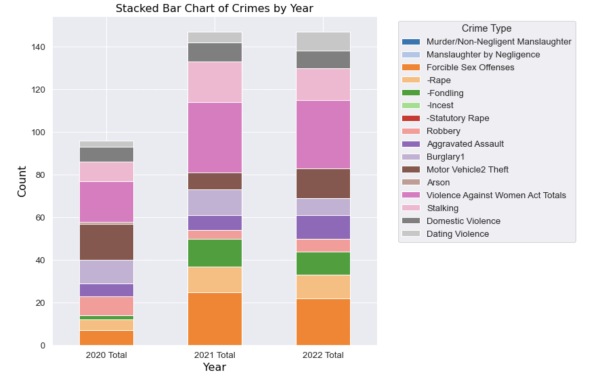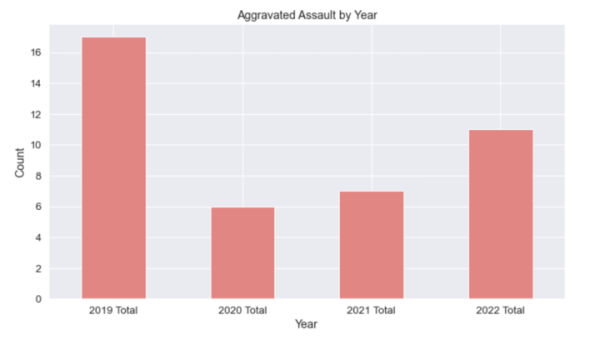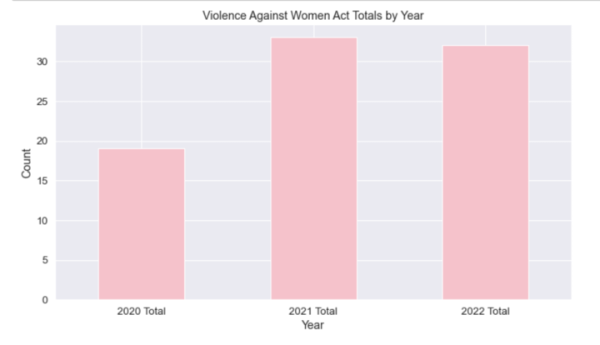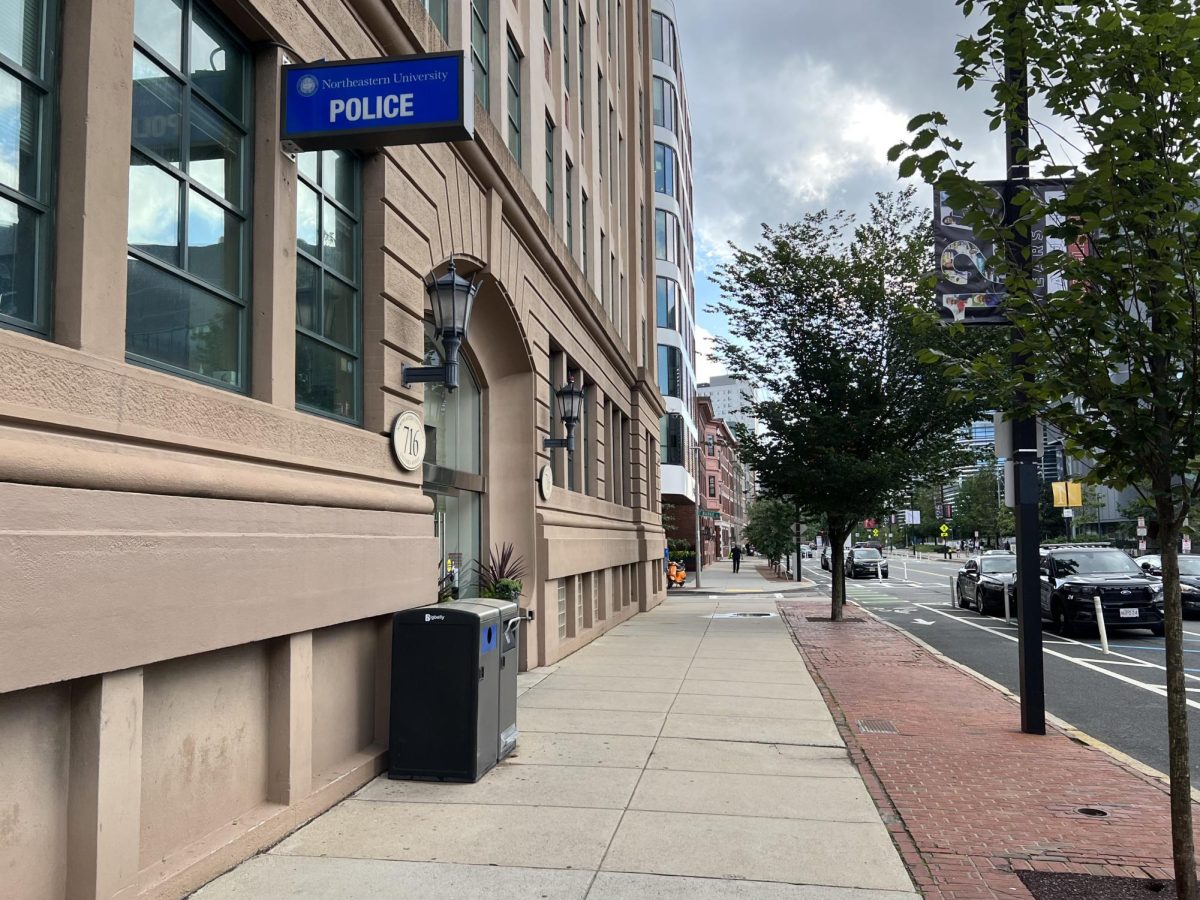Every October, colleges around the country — including Northeastern — are mandated to release statistics of campus crime for the preceding three calendar years and information on how safety measures have improved, according to federal law.
The newest data from 2022 reflects 102 total crime reports on the Boston campus, compared to 103 in 2021 and 81 in 2020. Disciplinary referrals include 15 drug violations in 2022, where no drug violations occurred in 2021. Liquor law violations are down in number from the previous year, with 237 in 2022 and 433 in 2021.
Release of these statistics are made possible by the 1990 Jeanne Clery Disclosure of Campus Security Policy and Campus Crime Statistics Act, or Clery Act, which aims to bring maximum transparency to the public by requiring universities to release information about campus crime.
College administrators are required to submit crime data to the United States Department of Education, which publishes crime statistics every year for schools receiving federal financial aid.
Since Northeastern is a private university not subject to public record laws, the Clery Act allows crime statistics to be made accessible to the public, but specific details about Northeastern police reports will likely remain private.
Northeastern’s Annual Security Report, or ASR, gives a detailed overview of the campus department’s policies and procedures, along with crime statistics and an annual fire report. The Northeastern University Police Department, or NUPD, published the 100-page report on their website, where reports from all Northeastern campuses can be found.
The crime data in the 2023 Boston campus ASR comes from 2020-2022 and is classified by type of offense. The total number of reports for each offense are separated by the location in which they occurred. The location categories are either on-campus, on-campus in student housing, non-campus or on public property.
More extensive definitions of these categories can be found on the Clery Act Appendix. A review of the data from the Boston campus ASR is as follows.
While overall crime numbers have remained about the same on the Boston campus between 2021 and 2022, there was a noted increase in both aggravated assaults and dating violence. There were six reports of aggravated assaults in 2020, seven in 2021 and 11 in 2022. There were three reports of dating violence in 2020, five in 2021 and nine in 2022.

Aggravated assault is defined in the ASR as “an unlawful attack by one person upon another for the purpose of inflicting severe or aggravated bodily injury.” In 2019, the university reported 17 aggravated assault reports. After dwindling down to six reports in 2020, numbers are rising again.

The Violence Against Women Act, or VAWA, was amended in 2013 to ensure mandatory crime reporting measures specified when individuals were specifically targeted because of their gender identity. The Violence Against Women section of the report includes three sections: stalking, domestic violence and dating violence.
Acts of both dating violence and domestic violence are deemed abuse under Massachusetts general law and are defined as one or more of the following occurrences, according to the ASR: attempt to cause or the causing of physical harm, fear of imminent physical harm or involuntarily coercion into sexual relations by force or threat.
The totals of these crimes were 27 in 2019, 19 in 2020, 33 in 2021 and 32 in 2022. Stalking yielded the highest amount of reports in each of the four years.
Dating violence reports had the highest increase, however, with three in 2020, five in 2021 and nine in 2022.

Northeastern’s London, San Francisco, Seattle, Portland, Charlotte, San Jose, Toronto and Vancouver campuses have fewer than five total documented crimes for 2020-2023 each, with footnotes on the reports that read either: “Statistics were requested from the local police department but no response was received for this request,” or “There are no on-campus residential facilities.”
The Clery Act is limited in its requirements of crime reporting on adjacent or abroad campuses, according to research conducted by the International Educator, a non-profit educational research organization.
Universities only need to report crime when they own or control the housing, campus or classroom space it occurs in. Programs run by other universities or third-party providers are not required to report any crimes.
As Northeastern continues to globally expand, efforts to increase information about crime reporting at other campuses would better align with the Clery Act’s goals, said Abigail Boyer, the associative executive director of the Clery Center.
“Even though [Northeastern] doesn’t have control over external agencies, promoting a culture of reporting amongst the campus community could increase awareness,” Boyer said.
Part of the misconception about Clery reporting is that reports can only be made to campus police, Boyer explained. But anyone who is considered a campus security authority, or CSA, is qualified to hear and pass along reports of crime or harassment to the NUPD. CSAs could include heads of sport or academic programs, campus support staff and others who hold leadership positions at the university.
NUPD officially operates on the Boston campus, but is still in charge of overseeing crime and safety at satellite campuses through communicating with local departments. “For Clery Act purposes, CSAs are required to report to NUPD the existence of all known incidents, including confidential incidents, so that those incidents can be recorded as statistics and, where appropriate, disclosed in the University’s ASR,” the ASR reads.
Boyer suggested a few ways to promote awareness of crime reporting, particularly at satellite campuses. Campaigns around reporting during orientation, threading prevention and awareness programming into curriculum and more information in the syllabus are a few ways this awareness could be implemented.
“Adding these measures could also serve as a way of connecting with the community,” Boyer said.
Northeastern did not respond to requests for comment concerning efforts to increase crime reporting at its satellite campuses.
Crimes are reported to NUPD on the Boston campus through their emergency phone number — 617-373-3333. NUPD also launched an app called SafeZone, which allows users to send a real-time, geographical location alert to officers who can then quickly respond to emergencies.












